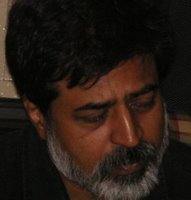Is it enough that the Prime Minister is honest?
How dire is the Indian situation? I find it difficult to gauge the truth.
On the one hand we have the "numbers" coming out every day. Infosys, Wipro, Reliance Energy, Biocon, ....... On the other, the Prime Minister announces "packages" for suicide riven Vidarbha. Where lies the truth? Is India making rapid progress towards the economic well being of its billion plus or is it down-sliding into desperate poverty?
Look at it another way: On the one hand, the ruling establishment, which, by the way, includes us, flaunts its billion plus demography as THE ASSEST of the nation; one that has catapulted us into the ranks of the great nations of the world and, virtually, into the UN Security Council. On the other, we allow the very people who make us such a great nation to die unnecessary deaths by the millions every year: female foeticide and infanticide, high infant mortality in general, high maternal mortality, starvation deaths, disease epidemics, one of the highest accident rates in the world, et al.
Do we imagine that it is only the Lakshmi Mittals and the Amartaya Sens and the Indira Nooyis that enable us to hold our heads high when we says we are Indians? No doubt they and many other "successful" Indians have helped erase the ubiquitous image of the naked, starving Indian: going around the world with a begging bowl. Perhaps that is all that we care about; how the world paints us. After all, it is only Maya.
Do we imagine that we will actually become a great nation on the strength of the handful of corporate czars, Nobel laureates, missiles and, atomic weapons? Are we labouring under the illusion that China is on the verge of becoming a great and powerful nation, whose voice is impossible to ignore because of its nuclear arsenal? Its unprecedented economic boom? A "booming economy" is only so much hot air unless it translates into a modicum of dignity for all: food in every thaali, a shirt on every back, a roof over every head.
Saturday, September 16, 2006
Rule of Law: A Raison d' etre
Law is not neutral. It never was. It is backed by force and, it commands it, also. Thus, rule of law is a misnomer -deliberate or inadvertent- to the extent that it connotes an absence of force. Besides, in the 21st Century it would be the height of naiveté to subscribe to the original view about rule of law: that it is exclusively based upon reason.
Let us examine the manner in which law and/ or rule of law comes into being:
India was conquered by the British by force, not law. British made law was subsequently applied, by force. Once the law was in place, it was enforced. Reason had very little role to play. One might argue that the law was reasonable but that begs the question of: by whose lights and, even assuming this was so, what gave the British the right to force us to follow their reason. Further, it is patent that howsoever hard they had tried to convince, the British would never have managed to persuade the Indians obey their laws. Thus, rule of law was backed by force, not reason.
Look at the same thing another way: all people who are free must necessarily have the freedom to choose, for example, to obey or not to obey another’s precepts. However, the ‘freedom of choice’ argument fails in the face of the need to regulate human behaviour in the social context. A solitary human being can do what he or she wishes, without constraint or fetter. The moment there are two people, they both feel the need for norms to regulate each other’s conduct. The conventional argument champions the 'law-rule of law' paradigm by claiming that there are two possible ways in which this need can be resolved: by force, the stronger prevailing over the weaker of the two and enforcing his/ her will; or, by law, when norms would get formulated to ensure that both persons get to enjoy an equal degree of ‘freedom of choice’ with neither encroaching upon the area of the other’s choices. This argument, however, fails to recognize a third possibility, which is often the way it goes in the real world. The stronger of the two (whether physically, intellectually or emotionally) establishes an ascendancy and, using that, lays down a set of rules as being “reasonable”. Thus, not only is the other, weaker person deprived of his/ her fair share of choice-space but he/ she is also forced to acknowledge that the rules imposed are “fair”. The next time he/ she infringes any of these, so called, fair rules, she is brought to book for violating the “law”. Since the person who imposed the law in the first place was able to do so because of his/ her superior strength, it is obvious that this person would also be able to enforce a penalty for the infringement of the law. Even worse, it is obvious that the situation would be untenable if one were to hypothise a situation where the weaker of the two were allowed to stipulate the rule (or law) to be followed, since this person would not be able to enforce the law unless the stronger person allowed that to happen. In such case 'law' or 'rule of law' would remain a concession by the stronger person. It is axiomatic that a concession can be withdrawn at the will (or the whim) of the giver. In other words, the concession can never be law.
Now, why would a concept that is premised on force and, the ability of the strong to compel the weak be touted as the panacea for freedom, equality and fair play? The only reason can be that it serves the purpose of the strong, by minimizing the resistance of the weak, lessening the need to remain perpetually on guard and, reducing the task of enforcing the law. What can be better for the master than when the slave (or the subject) willingly accepts the limits upon his her freedom?
Law is not neutral. It never was. It is backed by force and, it commands it, also. Thus, rule of law is a misnomer -deliberate or inadvertent- to the extent that it connotes an absence of force. Besides, in the 21st Century it would be the height of naiveté to subscribe to the original view about rule of law: that it is exclusively based upon reason.
Let us examine the manner in which law and/ or rule of law comes into being:
India was conquered by the British by force, not law. British made law was subsequently applied, by force. Once the law was in place, it was enforced. Reason had very little role to play. One might argue that the law was reasonable but that begs the question of: by whose lights and, even assuming this was so, what gave the British the right to force us to follow their reason. Further, it is patent that howsoever hard they had tried to convince, the British would never have managed to persuade the Indians obey their laws. Thus, rule of law was backed by force, not reason.
Look at the same thing another way: all people who are free must necessarily have the freedom to choose, for example, to obey or not to obey another’s precepts. However, the ‘freedom of choice’ argument fails in the face of the need to regulate human behaviour in the social context. A solitary human being can do what he or she wishes, without constraint or fetter. The moment there are two people, they both feel the need for norms to regulate each other’s conduct. The conventional argument champions the 'law-rule of law' paradigm by claiming that there are two possible ways in which this need can be resolved: by force, the stronger prevailing over the weaker of the two and enforcing his/ her will; or, by law, when norms would get formulated to ensure that both persons get to enjoy an equal degree of ‘freedom of choice’ with neither encroaching upon the area of the other’s choices. This argument, however, fails to recognize a third possibility, which is often the way it goes in the real world. The stronger of the two (whether physically, intellectually or emotionally) establishes an ascendancy and, using that, lays down a set of rules as being “reasonable”. Thus, not only is the other, weaker person deprived of his/ her fair share of choice-space but he/ she is also forced to acknowledge that the rules imposed are “fair”. The next time he/ she infringes any of these, so called, fair rules, she is brought to book for violating the “law”. Since the person who imposed the law in the first place was able to do so because of his/ her superior strength, it is obvious that this person would also be able to enforce a penalty for the infringement of the law. Even worse, it is obvious that the situation would be untenable if one were to hypothise a situation where the weaker of the two were allowed to stipulate the rule (or law) to be followed, since this person would not be able to enforce the law unless the stronger person allowed that to happen. In such case 'law' or 'rule of law' would remain a concession by the stronger person. It is axiomatic that a concession can be withdrawn at the will (or the whim) of the giver. In other words, the concession can never be law.
Now, why would a concept that is premised on force and, the ability of the strong to compel the weak be touted as the panacea for freedom, equality and fair play? The only reason can be that it serves the purpose of the strong, by minimizing the resistance of the weak, lessening the need to remain perpetually on guard and, reducing the task of enforcing the law. What can be better for the master than when the slave (or the subject) willingly accepts the limits upon his her freedom?
Labels:
India,
Justice,
Post post-modern,
Power,
Rule of Law,
The Sovereign State
Subscribe to:
Posts (Atom)










